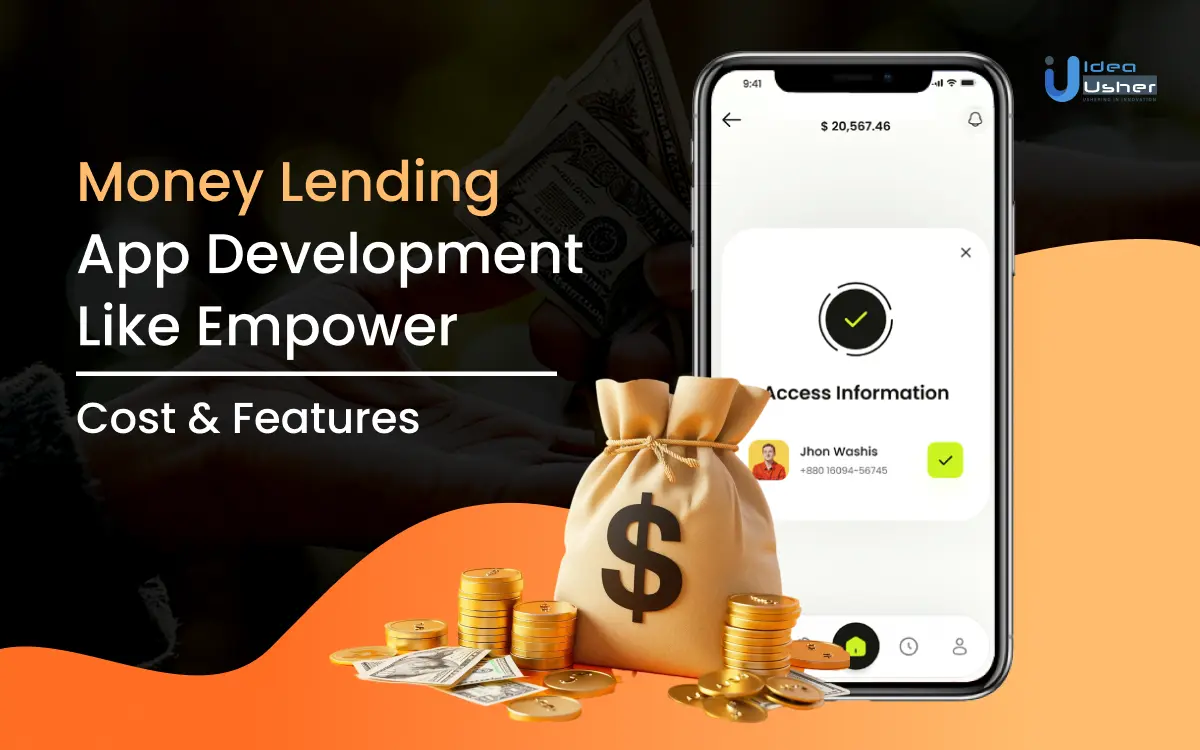Life is full of unexpected money problems. From medical emergencies to car repairs, unexpected expenses can mess up anyone’s budget. This is where money-lending apps like Empower are really helpful. By providing quick access to small loans, these apps have become a lifeline for millions, helping them bridge financial gaps until their next payday.
Did you know that the global market for digital lending platforms was a significant $5.84 billion in 2021? This number is expected to increase rapidly, with an estimated yearly growth rate of 25.9% between 2022 and 2030. This shows that more and more people are drawn to money-lending apps, as they offer easy and fast access to funds without the trouble of traditional loan applications. In urgent situations, people might not have time to wait for bank approvals. Money lending apps provide a simple process with minimal paperwork, helping individuals address their immediate financial needs.
With all these factors in play, there’s no doubt that money-lending apps are becoming really popular in the US market. So, in this blog, we will cover all the essential details for creating a money-lending app similar to Empower.
Important Things to Know About the Empower App
Empower is a comprehensive money-lending app designed to help users take control of their money. Launched in 2014, the app has garnered millions of downloads and boasts an impressive 4.8-star rating on the Google Play Store. Empower offers a suite of tools, including budgeting, saving goals, and investment tracking, to provide a holistic view of financial health. To address short-term financial needs, the app also provides instant cash advances with no interest or fees.
What Makes the Empower App Unique?
The increasing complexity of financial lives, coupled with the growing reliance on digital platforms, has fueled the demand for comprehensive financial management tools like Empower. By offering a suite of features catering to various financial needs, Empower has tapped into a lucrative market.
- Automated Budgeting: Simplifying the budgeting process is a key driver of user adoption. By automating financial tracking, Empower reduces the time and effort required to manage finances.
- Investment Checkup: Providing insights into investment performance empowers users to make data-driven decisions. This feature enhances user engagement and loyalty.
- Cash Advance: Offering short-term financial relief through cash advances can attract users facing unexpected expenses. While not a primary revenue generator, it can serve as a customer acquisition tool.
- Fee Analyzer: Identifying potential cost savings through fee analysis helps users maximize their income. This feature positions Empower as a value-added service provider.
- Investment Performance: By offering tools to track and analyze investment performance, Empower helps users make informed investment decisions. This feature can lead to increased asset management opportunities.
The combination of these features creates a compelling value proposition for users. Empower addresses various financial needs, fostering user loyalty and generating recurring revenue through subscription fees or fee-based services.
Why People Love Using Empower App
- Holistic Financial Overview: Provides a comprehensive view of finances, from budgeting to investing.
- Time-Saving Automation: Automates tasks like budgeting and transaction categorization.
- Financial Education: Offers insights and tips to improve financial literacy.
- Quick Access to Cash: Provides instant cash advances for emergencies.
- Fee Savings: Helps identify hidden fees and potential cost-saving opportunities.
Key Market Takeaways for Digital Lending Apps
According to GrandViewResearch, the digital lending app market is experiencing rapid growth, with a projected market value of USD 7.04 billion in 2022 and an anticipated CAGR of 26.5% through 2030. This surge is significantly attributed to the rise of open banking, a financial system empowering businesses to securely access customer financial data.
Source: GrandViewResearch
Open banking enables lenders to make swift and informed loan decisions by consolidating borrower data such as credit scores, previous loans, and outstanding debts. This data-driven approach allows for personalized loan offerings, fostering trust and loyalty among customers. A survey conducted by Credit Kudos in late 2021 revealed that 87% of lenders in the UK anticipate utilizing open banking technology by 2023. This widespread adoption underscores the technology’s potential to revolutionize the lending industry.
Beyond open banking, emerging trends such as AI and machine learning are further shaping the digital lending landscape. These technologies enhance credit risk assessment, fraud detection, and customer experience. Additionally, blockchain technology integration promises to enhance transparency, security, and efficiency in the origination and management of loans.
Work with Ex-MAANG developers to build next-gen apps schedule your consultation now
What Features Make Empower So Popular Among Its Users?
Empower has successfully positioned itself as a go-to financial management app for many users. Several key features contribute significantly to its popularity.
1. Comprehensive Financial Overview
Empower’s “Empower Dashboard” provides a centralized view of a user’s financial landscape, aggregating data from various accounts. This holistic perspective empowers users to make informed decisions about their money.
2. Automated Savings Features
Empower’s “AutoSave” feature facilitates effortless saving by automatically setting aside funds. Complementing this, “Spending Insights” offers budgeting tools to help users track expenses, identify spending patterns, and create tailored budgets.
3. Credit Building
Empower’s “Thrive Line of Credit” and “Cash Advance” features have proven popular among users aiming to improve their credit scores. These tools offer responsible pathways to build credit history.
4. Personalized Financial Guidance
Empower’s “Smart Recommendations” leverage user data to provide tailored financial advice. By offering personalized insights, the app helps users optimize their financial well-being.
5. Strong Security
Empower’s “Empower Shield” encompasses the app’s robust security measures, including encryption and fraud protection. This commitment to safeguarding user data has been instrumental in building trust and loyalty.
Innovative Features that Can Enhance Money-Lending Apps Like Empower
The financial technology landscape is rapidly evolving, presenting numerous opportunities for money-lending apps to differentiate themselves and attract a wider customer base. By incorporating the following innovative features, businesses can enhance user experience, increase customer loyalty, and drive growth.
1. AI-Powered Credit Scoring
Leveraging artificial intelligence to assess creditworthiness beyond traditional credit scores can expand access to credit for underserved populations. By analyzing alternative data points such as spending patterns, income stability, and social media behavior, lenders can make better decisions and offer tailored loan products.
2. Personalized Financial Coaching
Integrating financial coaching services into the app can provide users with personalized guidance on budgeting, saving, and debt management. By offering expert advice and support, lending companies can position themselves as responsible financial partners and increase customer engagement.
3. Blockchain-Based Loan Origination
Implementing blockchain technology can streamline the loan origination process by developing a secure and transparent platform. This can reduce paperwork, expedite loan approvals, and enhance trust between lenders and borrowers.
4. Gamification for Financial Wellness
Introducing gamification elements can make managing finances more enjoyable and engaging. By incorporating rewards, challenges, and progress tracking, lending companies can encourage users to adopt healthy financial habits and increase app usage.
5. Open Banking Integration
Integrating with open banking platforms allows lenders to access a broader range of financial data, enabling more accurate credit assessments and personalized loan offers. This can also facilitate seamless account linking and payment processing.
6. Instant Loan Disbursement
Lenders can use advanced technologies such as artificial intelligence and machine learning to develop systems that approve and disburse loans instantly. This capability can significantly enhance customer satisfaction and attract impulsive borrowers.
How to Develop a Money Lending App like Empower?
Developing a money lending app like Empower requires a strategic approach that combines financial technology with user-centric design. Here are the nine key steps involved:
1. Market Research and Business Model Definition
Conducting thorough market research is crucial to identify the target audience, competitors, and industry trends. By understanding the market dynamics, companies can define the app’s unique value proposition, revenue model, and target market. This foundational step ensures that the business strategy is aligned with market needs and sets the stage for success.
2. Financial Technology Integration
Integrating financial technology is essential for a seamless user experience. Selecting appropriate financial technology partners for payment processing, fraud prevention, and credit scoring is vital. Developing robust APIs to integrate with banking systems and other financial institutions ensures smooth operations and enhances the app’s functionality. This step is critical for businesses aiming to provide reliable and secure services.
3. User Experience Design
Creating a user-friendly and intuitive app interface is a top priority. Companies should focus on features that enhance the user experience, such as easy application processes, quick approvals, and transparent terms. A well-crafted UX is crucial for ensuring that app users can easily navigate the app.
4. Credit Risk Assessment Model
Developing a sophisticated credit risk assessment model is necessary to evaluate borrowers accurately. Incorporating alternative data sources for a comprehensive credit evaluation can improve the accuracy of the assessments. Continuously refining the model based on performance data helps in maintaining its effectiveness. Businesses benefit from reduced risk and improved lending decisions.
5. Develop Financial Products and Services
Defining the range of financial products to offer is another key step. These products might include cash advances, lines of credit, and installment loans. Developing pricing strategies and terms that align with the target market ensures that the offerings are competitive and attractive to users. This step allows companies to diversify their revenue streams and meet various user needs.
6. Regulatory Compliance
Understanding and adhering to all relevant financial regulations and consumer protection laws is essential. Implementing robust compliance procedures mitigates risks and ensures that the business operates within legal frameworks. This step protects companies from potential legal issues and builds user trust through adherence to regulatory standards.
7. Technology Infrastructure
Building a secure and scalable technology platform supports the app’s operations effectively. Implementing data encryption and protection measures safeguards user information. A robust technology infrastructure is vital for maintaining the app’s performance and security, which is crucial for user trust and business continuity.
8. Customer Support and Financial Education
Providing excellent customer support through multiple channels enhances user satisfaction. Offering financial education resources empowers users and builds trust. These resources can help users make informed financial decisions, contributing to their overall financial well-being. Companies benefit from increased user loyalty and positive word-of-mouth.
Cost of Developing a Money Lending App like Empower
| Category | Details | Cost Range |
| Research and Market Analysis | Basic | $1,000 – $5,000 (Desk research, competitor analysis) |
| Comprehensive | $5,000 – $10,000 (In-depth market research, user interviews, SWOT analysis) | |
| App Features | Core features (user onboarding, loan application, disbursement) | $5,000 – $20,000 |
| Basic functionality | $5,000 – $10,000 | |
| Complex features (e.g., advanced eligibility checks, document automation) | $10,000 – $20,000 | |
| Advanced features (credit scoring, financial management tools) | $10,000 – $25,000 | |
| Basic integration of third-party credit scoring models | $5,000 – $10,000 | |
| Custom credit scoring model development | $10,000 – $20,000 | |
| Comprehensive financial management tools (budgeting, saving goals) | $15,000 – $25,000 | |
| Front-End Development | Basic UI/UX design | $3,000 – $7,000 |
| Complex UI/UX design with animations and interactions | $7,000 – $15,000 | |
| Development of mobile and web app | $5,000 – $10,000 per platform | |
| Back-End Development | Core functionalities (user management, loan processing) | $5,000 – $15,000 |
| Complex functionalities (risk assessment, fraud prevention) | $15,000 – $30,000 | |
| Integration with payment gateways and other third-party services | $3,000 – $10,000 | |
| Testing and Quality Assurance | Basic testing | $1,500 – $3,000 |
| Comprehensive testing (unit, integration, performance, security) | $3,000 – $5,000 | |
| UI/UX Design | Basic design | $2,000 – $5,000 |
| Detailed design with wireframes and prototypes | $5,000 – $10,000 | |
| Additional Costs | Legal and Compliance | $1,000 – $5,000 (depending on jurisdiction and complexity) |
| Infrastructure | $1,000 – $3,000 (cloud servers, databases) | |
| Marketing and Promotion | $2,000 – $10,000 (app store optimization, advertising) | |
| Total Cost Estimate | $10,000 – $100,000 |
Beyond the previously mentioned factors, developing a money lending app like Prosper involves several other unique challenges that influence development costs and overall business operations.
1. Loan Origination and Servicing
Efficiently processing loan applications, underwriting, and disbursing funds requires robust loan origination systems. Additionally, managing loan servicing activities such as payment collection, delinquency management, and loan recovery involves specialized processes and technology. These functions demand significant investment in infrastructure and personnel.
2. Marketplace Dynamics and Matching Algorithm
Creating a thriving marketplace that effectively connects borrowers and investors is crucial. Developing a sophisticated matching algorithm that considers various factors like creditworthiness, loan terms, and investor preferences is essential. Continuously optimizing the matching process to improve loan performance is an ongoing challenge that impacts development costs.
3. Secondary Market and Liquidity
Providing investors with liquidity options is essential for a successful P2P lending platform. Developing a secondary market where investors can sell their loans can increase platform liquidity and attract more investors. However, establishing and managing a secondary market involves additional complexities and costs.
4. Data Analytics and Risk Management
Leveraging data analytics to optimize loan pricing, risk assessment, and portfolio management is critical. Building a robust data infrastructure and developing advanced analytics capabilities requires significant investment. Furthermore, it is crucial to stay vigilant in monitoring market trends and economic indicators in order to evaluate and mitigate risks for maintaining long-term sustainability.
What are the Tech Stacks Required to Develop Money Lending App like Empower?
Developing a money-lending app like Empower involves using a robust and diverse tech stack. These technologies ensure the app is secure, scalable, and user-friendly while providing an optimal experience for both borrowers and lenders.
1. Frontend Development
Designing a visually captivating and user-friendly interface is essential to capture and retain user attention. It’s important for companies to prioritize mobile devices when developing their apps to ensure a seamless experience for mobile users. Additionally, accessibility for users with disabilities is a crucial aspect to consider. By utilizing frontend frameworks like React, Angular, or Vue.js, developers can create dynamic interfaces that adapt to different screen sizes and devices, ultimately improving the overall user experience.
2. Robust Backend Development
Developing RESTful APIs is essential for seamless communication between the front end and back end. Selecting a suitable database, whether SQL or NoSQL, ensures efficient data storage and retrieval. Implementing server-side logic is necessary for business rules, calculations, and data processing. Using backend frameworks like Node.js, Python (Django or Flask), or Ruby on Rails facilitates robust backend development. These frameworks offer a robust base for creating server-side applications that are scalable and easy to maintain.
3. Scalable Cloud Infrastructure
Utilizing cloud platforms like AWS, Azure, or GCP provides scalability and flexibility. Adopting a microservices architecture allows for independent component management, enhancing the app’s scalability. Implementing efficient load balancing ensures the system can handle increased traffic and prevent overload, maintaining performance and reliability.
4. Real-Time Transaction Processing
Integrating secure payment gateways is essential for seamless transactions. Establishing robust APIs for communication with banks and financial institutions ensures smooth operations. Implementing real-time transaction monitoring and fraud detection helps safeguard users and maintain trust in the app.
5. Credit Risk Assessment Model
Utilizing machine learning algorithms accurately assesses creditworthiness. Incorporating alternative data sources, such as social media and spending patterns, provides a comprehensive credit evaluation. Continuously refining the credit risk model based on performance metrics ensures accuracy and reliability.
6. Data Analytics and Business Intelligence
Implementing a data warehouse enables the storage and processing of large datasets. Utilizing BI tools for data analysis and insights generation is crucial for informed decision-making. Employing predictive analytics helps in forecasting trends and customer behavior, enabling businesses to adapt and optimize their strategies.
7. Integration with Financial Institutions
Integrating with open banking APIs allows for seamless account linking, enhancing the app’s functionality. Establishing secure data exchange protocols with financial institutions ensures data integrity and security. Managing APIs effectively is crucial for efficient communication and integration.
Latest Technologies That Can Enhance a Money Lending App
By leveraging cutting-edge technologies, money lending apps can gain a competitive edge, enhance risk management, and provide outstanding customer experiences.
1. Predictive Analytics
The use of predictive analytics is revolutionizing the lending industry by enabling businesses to make decisions based on data. By utilizing advanced statistical models and machine learning algorithms, financial apps can examine large sets of data to recognize patterns and trends in borrower behavior. According to a study, predictive models can significantly enhance credit risk assessment, leading to lower default rates and higher profitability. Companies like LendUp have effectively integrated predictive analytics to provide customized loan products and pricing, thereby improving customer satisfaction and loyalty.
2. Augmented Reality
The integration of AR technology is transforming the way individuals engage with financial services. Through the use of AR, financial apps can superimpose digital information onto physical environments, delivering immersive and captivating experiences for users. For example, AR can be harnessed to present loan repayment schedules as interactive 3D models, providing borrowers with a visual representation of their financial commitments. Just as companies like IKEA have showcased the power of AR in the retail sector, similar possibilities exist in the lending industry to enrich customer interaction and comprehension.
3. Natural Language Processing:
Natural language processing is enabling more human-like interactions between lenders and borrowers. By understanding and responding to NL queries, chatbots powered by NLP can provide personalized financial advice, answer questions about loan products, and assist with the application process. A study by Juniper Research predicts that chatbots will save businesses billions of dollars annually by automating customer service tasks. Companies like Capital One have invested heavily in NLP technology to enhance customer experience and improve operational efficiency.
How Money Lending Apps like Empower Generates Revenue?
Let’s now understand how money-lending apps like Empower generate revenue,
1. Subscription Fees
Empower charges an auto-recurring subscription fee of $8 per month after a 14-day free trial period. This fee is automatically debited from the user’s linked external bank account. The subscription fee is a significant revenue stream, as it ensures a steady monthly income from all active users. For example, with 100,000 active users, Empower would generate $800,000 per month from subscription fees alone.
2. Foreign Transaction Fees
For users of the Empower Card, foreign transaction fees apply to international transactions. The fee is 1% of the total transaction amount. These fees provide an additional revenue stream whenever users make purchases abroad. If a user spends $1,000 internationally, Empower will earn $10 from the transaction fee.
3. Instant Delivery Fees
Empower offers instant delivery for cash advances to linked external bank accounts, charging fees based on the advance amount. The fee structure is detailed in the table below:
| Cash Advance Amount | Instant Delivery Fee |
| $0 – $10.00 | $1.00 |
| $10.01 – $49.99 | $2.00 |
| $50.00 – $74.99 | $3.00 |
| $75.00 – $99.99 | $4.00 |
| $100.00 – $149.99 | $5.00 |
| $150.00 – $199.99 | $6.00 |
| $200.00 – $249.99 | $7.00 |
| $250.00 – $299.99 | $8.00 |
| $300 or more | 3% of Advance Amount |
For example, if a user requests an instant delivery of $150, they would pay a $6 fee. These fees generate significant revenue, especially with frequent use.
4. Thrive Line of Credit Fees
Empower offers the Thrive line of credit, which has its own set of instant delivery fees. For draws up to $300, the fees are consistent with those for cash advances. For amounts over $300, the fee is the lesser of $20 or 3% of the draw amount. For instance, drawing $800 from the line of credit would incur a $20 instant delivery fee. This structure ensures additional revenue from users who need larger sums quickly.
5. Interest Charges
Empower provides flexible repayment options for its line of credit. Users who choose to repay their draw in full by their next paycheck date incur no interest. However, those who schedule repayments manually or opt for multiple split payments accrue interest at an APR of 35.99%. This interest income is a significant revenue source, especially from users who require longer repayment periods.
Late Fees
Empower charges late fees of up to $20 per late payment. The fee is 5% of the overdue principal amount, capped at $20. For example, an overdue amount of $50 would result in a $2.50 late fee. These fees contribute to the platform’s revenue by penalizing late payments and encouraging timely repayments.
Conclusion
Money lending apps like Empower have changed how people get loans. They offer easy, accessible, and flexible loan options, empowering individuals to handle unexpected expenses, take advantage of opportunities, and improve their financial situation. These apps allow people to apply for loans quickly and easily, and they make the terms and conditions clear, which has had a positive impact on many lives.
For businesses, creating a similar loan app can be an awesome opportunity to meet the growing demand for alternative financial services. By making a user-friendly app, offering good interest rates, and managing risks well, companies can attract many customers and make money from loan fees, interest, and other services.
Looking to Develop a Money Lending App like Empower?
Idea Usher is your ideal partner. We’ll craft a feature-rich platform incorporating advanced algorithms for credit scoring, risk assessment, and also fraud detection. Leveraging our 500,000+ hours of coding expertise, we’ll develop a secure, scalable architecture using technologies like React Native for cross-platform compatibility, Python for backend logic, and robust databases like PostgreSQL. Our solution will include seamless integrations with payment gateways, KYC verification tools, and AI-driven customer support, ensuring a user-friendly and efficient lending experience.
Work with Ex-MAANG developers to build next-gen apps schedule your consultation now
FAQs
Q1: How to create a money lending app?
A1: Creating a money lending app involves several key steps. First, thorough market research must be conducted to identify target users and competitors. Develop a comprehensive business plan outlining the app’s features, target market, revenue model, and monetization strategy. Design a user-friendly interface and secure backend infrastructure. Integrate necessary features like loan eligibility checks, document verification, payment gateways, and customer support.
Q2: How much does it cost to develop a loan lending app?
A2: The expense of developing a money lending app depends on various factors. Simpler apps with basic features may require a smaller investment, while complex apps with advanced functionalities and integrations demand higher budgets. Additional costs may arise from design, development, testing, and ongoing maintenance.
Q3: What are the features of a money-lending app?
A3: Money lending apps typically offer features such as user registration, loan eligibility checks, application forms, document uploads, real-time approval, digital signatures, loan disbursement, repayment schedules, payment options, customer support, and account management. Some advanced applications may include features like credit score tracking, financial education, and personalized loan recommendations.
Q4: How do money-lending apps make money?
A4: Money lending apps primarily generate revenue through interest charged on loans. Additionally, they may earn fees from loan origination, processing, or late payments. Some apps also offer premium services or financial products for additional income. By effectively managing loan portfolios, minimizing defaults, and optimizing interest rates, these apps can achieve profitability.
























